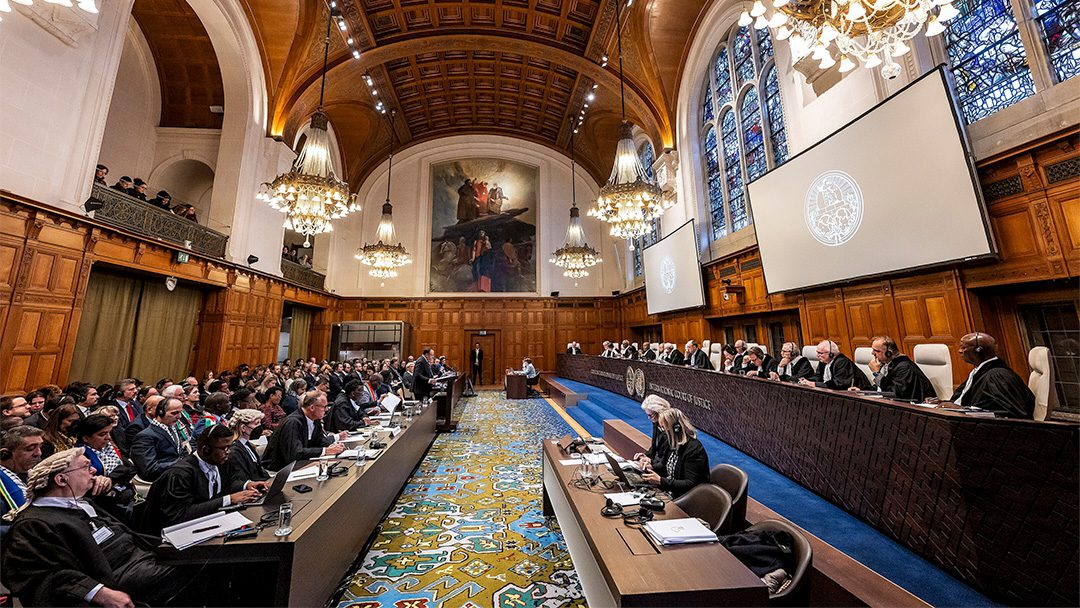On 7 October 2023, over 3000 Islamist extremists invaded Israel and slaughtered over 1200 innocent persons. It was a brutal attack on the existence of the Jewish State.
A similar attack is taking place on a larger but less visible scale within the United Nations.
A group of about eighty Islamic, Arab and African states, together with some European states, have banded together to assault the Jewish State of Israel. The scene of this massive crime is the International Court of Justice in The Hague.
Astoundingly, this event seems so far to have avoided the attention of most people. Yet, it is no exaggeration to say that this legal attack presents an existential threat to the Jewish State. Some had likened it to the War of Independence in 1948 when the Jewish community in Palestine was fighting for the survival of the Jewish people and the infant State of Israel.
What is happening? In December 2022, a group of 87 UN member states voted in favour of a resolution in the UN General Assembly. The resolution is a lengthy document full of wild assertions and condemnations of Israel. It asks the International Court of Justice in The Hague to issue an ‘Advisory Opinion’ about ‘the legal consequences’ of Israel’s ‘policies and practices’ in East Jerusalem, West Bank and Gaza. The resolution basically asserts that Israel’s occupation of Palestinian territory since 1967 is denying the Palestinian right to a state on the whole of that territory. The Court should declare the occupation to be illegal.
Most UN member states did not support this resolution, and yet it was adopted because many states abstained from voting.
Since December 2022, fifty states and three international organisations (the Arab League, the Organisation of Islamic Cooperation, and the African Union) have made written statements to the Court. Most of them are extremely hostile towards Israel. The essence of their claim: Palestine (all the territory between the Jordan River and the Mediterranean) belongs to the Palestinian people. The creation of the Jewish state in 1948 and the occupation of Palestinian territory since 1967 are preventing the establishment of an Arab State of Palestine.
They demand the immediate, total and unconditional withdrawal of all Israeli military and civilians from the entirety of the West Bank, East Jerusalem, and Gaza.
This is an astounding and far-reaching claim. Never before has a claim been made that an occupation is illegal.
The arguments put to the Court are very similar to those put by the Palestinian Arabs led by the Grand Mufti of Jerusalem Haj Amin al Husseini in the 1920s, denying the legitimacy of a Jewish homeland on Arab territory and demanding the right to use violence to prevent the creation of a Jewish homeland.
One could feel a deep hatred of Jews in many of the presentations. Yet the judges did not bat an eyelid.
It is a continuation of the attacks by the Arab states on Israel in 1948, 1967 and 1973—all of them intended to wipe the Jewish state from the map.
The difference is that claims are now being made by many UN member states in the highest court in the world.
The Arab, Islamic and African states were all represented in court by highly influential (and no doubt highly-paid) international lawyers—like Professor Philippe Sands, a British/French Jewish academic who is the main legal adviser to the self-styled ‘State of Palestine’.
Several weeks ago, the Court held oral hearings in which the states and organisations could present their cases in person.
thinc. was assisting the Republic of Fiji and had the opportunity to sit in court throughout the 6-day hearings.
It was an absurd and bizarre experience. Here were the world’s leading lawyers— regally adorned and speaking the King’s English—arguing that the Jewish State of Israel is illegitimate and does not even deserve to exist. One could feel a deep hatred of Jews in many of the presentations. Yet the judges did not bat an eyelid.
Although most states argued that the Court should issue an Opinion condemning Israel, several states have objected to the Court deciding on these issues. The UK, Hungary, Zambia, Czech Republic, France, Nauru, and Fiji all argued that the Court should exercise its judicial discretion not to issue an opinion at all because to do so would undermine the peace process requiring a negotiated outcome. The USA also argued that the Court should not take sides.
Fiji affirmed the important role of this Court as the highest judicial organ of the United Nations in resolving disputes between states and assisting UN organs in their activities, but objected to the use of the UN system to prosecute only one of the parties. The Court, Fiji argued, must not ignore the rights of Israel, or the responsibilities of the Palestinian people.
In Fiji’s view, both Palestinians and Israel are bound to comply with the Oslo Accords, which require negotiations on all final status issues, including Jerusalem, settlements, security and borders. Israel and the PLO have also agreed not to take unilateral steps to avoid negotiations.
In Fiji’s view, the UN bodies have presented a distinctly one-sided narrative that ignores the complexity of the dispute and misrepresents the legal, historical, and political context.
Fiji provided several reasons why the Court should exercise its judicial discretion not to render an Advisory Opinion on the questions that have been posed by the General Assembly:
First, the Request is a legal manoeuvre that circumvents the existing internationally sanctioned and legally binding framework for the resolution of the Israel-Palestine dispute;
Second, to give an opinion, in this case, would have the effect of circumventing the principle that a State is not obliged to allow its disputes to be submitted to a judicial settlement without its consent and;
Third, due to the one-sided formulation of the questions posed in Resolution 77/247, the Court does not have before it the accurate and reliable information that it would need to render an opinion on the questions posed.
The Court heard oral presentations from 19th–26th February 2024.
It is expected the Court will issue its decision within the next few months.












Surely people know God has his eye on Israel.as stated in the Torah.